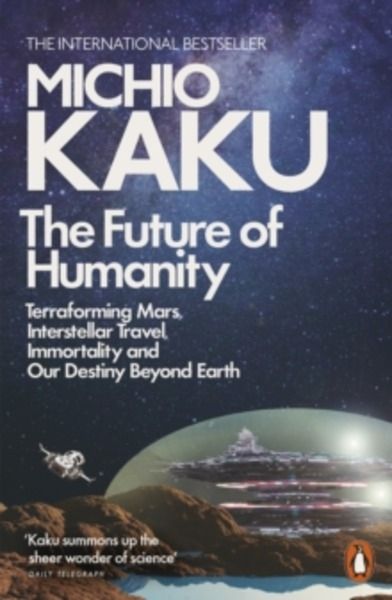The Future of Humanity : Terraforming Mars, Interstellar Travel, Immortality, and Our Destiny Beyond

Editorial Penguin UK
Fecha de edición febrero 2019 · Edición nº 1
Idioma inglés
EAN 9780141986067
368 páginas
Libro
encuadernado en tapa blanda
Resumen del libro
A SUNDAY TIMES BOOK OF THE YEARThe No.1 bestselling author of The Future of the Mind brings us a stunning new vision of our future in spaceHuman civilization is on the verge of living beyond Earth. But how will it happen? World-renowned physicist Michio Kaku takes us on a journey to the future, introducing the mind-boggling developments in robotics, nanotechnology and biotechnology that will one day enable us to make our homes among the stars. 'With admirable clarity and ease, Kaku explains how we might colonize not only Mars but some of the rocky moons of the gas giants Jupiter and Saturn .
. . The book has an infectious, can-do enthusiasm' Steven Poole, The Wall Street Journal'Kaku grounds his readers in science happening right now, while throwing open the windows to imagine where it might lead in a thousand years' Adam Frank, The New York Times Book Review'Kaku is an international treasure and a man of infectious enthusiasm' The Times
Biografía del autor
x{0026}lt;P x{0026}lt;B Michio Kaku,x{0026}lt;/B nacido en 1947 en California, Estados Unidos, de padres japoneses, es un eminente físico teórico y uno de los creadores de la teoría de campos de cuerdas. Apadrinado por Edward Teller, que le ofreció la beca de ingeniería Hertz, se formó en Harvard y en el Laboratorio Nacional Lawrence Berkeley de la Universidad de California, donde obtuvo el doctorado en física en 1972. Desde hace casi treinta años ocupa la Cátedra Henry Semat de Física Teórica en la Universidad de Nueva York y es uno de los divulgadores científicos más conocidos del mundo; presenta dos programas de radio y participa en espacios de televisión y documentales. Es autor además de decenas de artículos y de varios libros, algunos de ellos traducidos al castellano: x{0026}lt;I El universo de Einsteinx{0026}lt;/I (2005), x{0026}lt;I Universos paralelos x{0026}lt;/I (2008), x{0026}lt;I Física de loimposiblex{0026}lt;/I (2009), x{0026}lt;I El futuro de nuestra mentex{0026}lt;/I (2014), x{0026}lt;I La física del futuro x{0026}lt;/I (2011), x{0026}lt;I El futuro de la humanidadx{0026}lt;/I (2018) y x{0026}lt;I La ecuación de Diosx{0026}lt;/I (2022).x{0026}lt;/P








